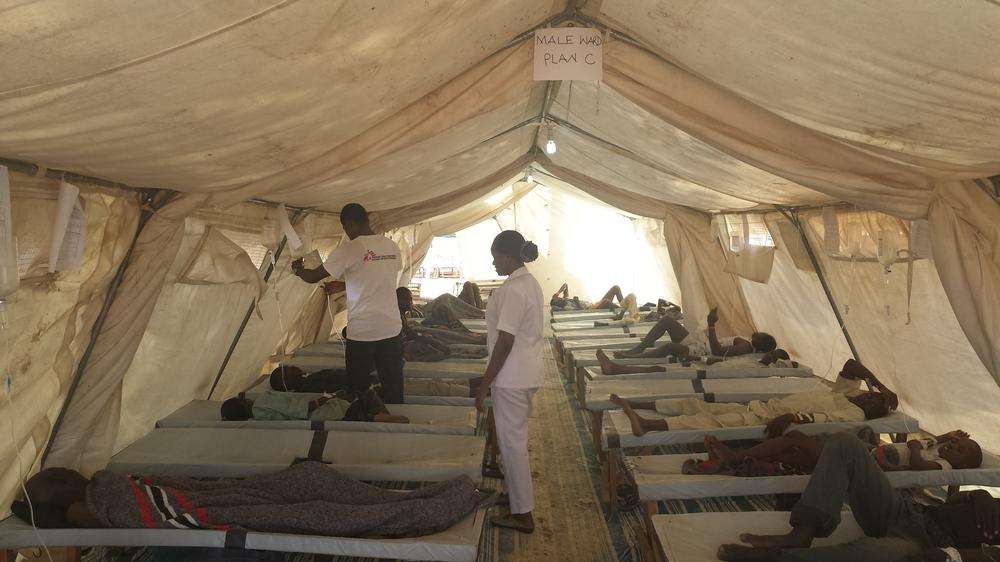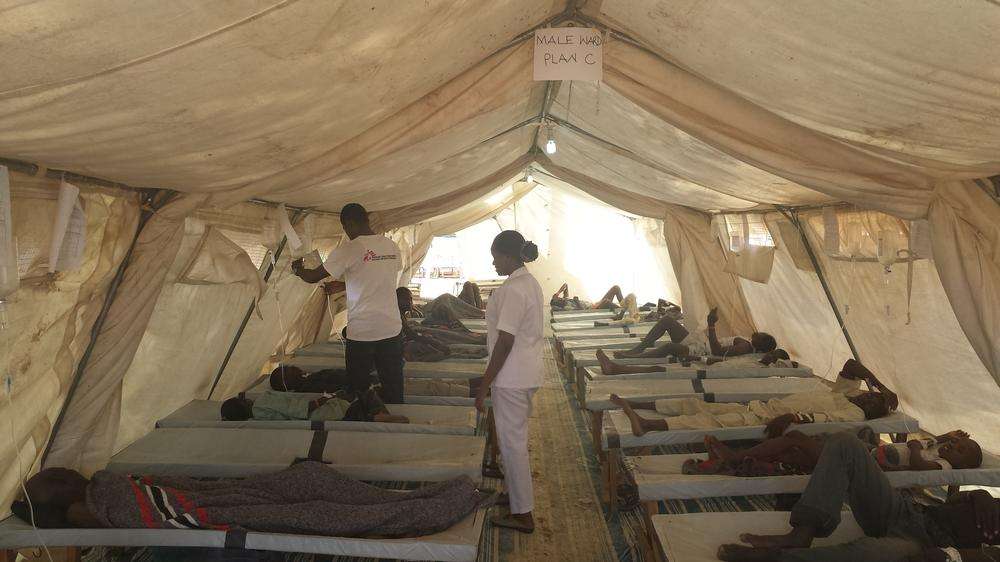An epidemic of cholera broke out in northeast Nigeria's remote Borno state in late September, 2014. In just one month there have been 4,500 cases and 70 deaths from cholera in Maiduguri, Borno state’s capital and principal town, and the number of cases continues to rise. Doctors Without Borders/Médecins Sans Frontières (MSF) was already operating in the region, and is now responding to the epidemic.
MSF provided assistance during a previous cholera outbreak in Maiduguri in 2010 and set up a 120-bed cholera treatment center (CTC) in the town’s hospital. In view of this latest epidemic, MSF has decided to reopen the CTC and increase the number of beds to 150.
Eight MSF staff members working in cooperation with Nigerian Ministry of Health personnel are providing care for the most serious cases, and 1,912 people have already received treatment. MSF has also set up five preventive oral rehydration points in several of the town’s districts. Action Contre la Faim (ACF) is looking into assisting with water, hygiene, and sanitation activities.
Cholera epidemics are frequent in Nigeria, and in January an outbreak occurred in Bauchi state, also in the northeast of the country. MSF teams provided treatment in a CTC to 8,500 of the 15,500 people who contracted the disease.
Three to five million people fall victim to cholera every year worldwide. An acute infection of the intestine, cholera is highly contagious and is transmitted by ingesting food or water contaminated by the bacterium or feces. The disease kills 100,000 to 120,000 people every year.
Cholera often occurs in over-crowed places where clean water, refuse collection, and lavatories are lacking or in short supply. Young children and the elderly are particularly at risk. Principal symptoms are watery diarrhea and vomiting, which can rapidly lead to severe dehydration and sometimes death.
However, if it is treated promptly, cholera is easy to cure. Treatment involves replacing lost fluids and salts to prevent dehydration—rehydration salts are administered orally. Seriously ill patients must be admitted to hospital and some may require as much as eight to twelve liters of intravenous fluids a day. Sometimes they also need antibiotics. In spite of the severity and speed at which the symptoms appear, with proper treatment patients can recover in a matter of days.
In May 2013, the Nigerian government declared a state of emergency in Borno, Yobe, and Adamawa states after the radicalization of Islamist movement Boko Haram, particularly active in the northeast of Nigeria. MSF initiated a first intervention in Borno State after an attack on the town of Baga in May 2013 but was quickly forced to suspend its activities because of the mounting insecurity. Some time later, an exploratory mission was carried out in Chibok in the south of the state, and 3,760 people were treated. Over half were children under the age of five, and many were suffering from malnutrition. After working in the area for ten weeks, in October 2013 operations had to be suspended yet again for security reasons.
MSF returned to Maiduguri again in May 2014 and is providing support to fixed and mobile medical clinics alike in two of the town’s three displaced persons camps. These camps host refugees who have fled from Boko Haram attacks in the surrounding region. There are now 58,000 people living in the three camps and the National Emergency Management Agency (NEMA) estimates that the total number of displaced people is 350,000.
MSF is able to continue its work combating the cholera epidemic in the town as it has not been subjected to attack for some time and the situation is calm. Yobe, Borno, and Adamawa states are extremely remote, and the restrictions on people getting in and out are taking their toll on trade and the local economy. In Borno state, access to health care for displaced people, Maiduguri’s vulnerable inhabitants, and the population is wholly inadequate.
Treating Cholera in 2014
In September and October 2014, cholera epidemics hit Haiti, Niger, and Ivory Coast. After a respite of over 18 months, cases of cholera have once again been recorded in the Haitian capital city Port au Prince, and there have been several small occurrences of the disease elsewhere in the country. MSF has opened five CTCs in Haiti.
Working in partnership with the Ministry of Health, MSF emergency teams have treated almost 1,000 patients for cholera in southern Niger. Some 40 cases have been recorded in a community of Ghanaian fishermen living in a district of Abidjan, the capital of Ivory Coast. Ghana is fighting its own cholera epidemic, and 15,000 people there have contracted the disease. MSF is exploring how best to respond to the emergency.





